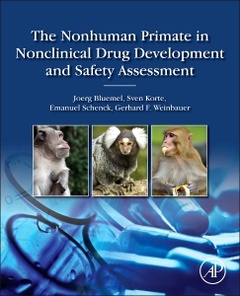Description
The Nonhuman Primate in Nonclinical Drug Development and Safety Assessment
Coordinators: Bluemel Joerg, Korte Sven, Schenck Emanuel, Weinbauer Gerhard
Language: English
Subject for The Nonhuman Primate in Nonclinical Drug Development and...:
Keywords
Nonclinical drug development; safety assessment; regulatory toxicology; translational medicine; nonhuman primates; pharmacaeutical science; biologics; small molecules; study design; toxicity testing; animal welfare; 3Rs; replace; refine and reduce; genetic polymorphisms; species selection; immunotoxicology
716 p. · 19x23.3 cm · Hardback
Description
/li>Contents
/li>Readership
/li>Comment
/li>
The Nonhuman Primate in Drug Development and Safety Assessment is a valuable reference dedicated to compiling the latest research on nonhuman primate models in nonclinical safety assessment, regulatory toxicity testing and translational science. By covering important topics such as study planning and conduct, inter-species genetic drift, pathophysiology, animal welfare legislation, safety assessment of biologics and small molecules, immunotoxicology and much more, this book provides scientific and technical insights to help you safely and successfully use nonhuman primates in pharmaceutical toxicity testing. A comprehensive yet practical guide, this book is intended for new researchers or practicing toxicologists, toxicologic pathologists and pharmaceutical scientists working with nonhuman primates, as well as graduate students preparing for careers in this area.
Section I: Genetics of Nonhuman Primate Species Commonly Used in Drug DevelopmentSection II: Comparative Physiology of NHP Species Used in Nonclinical Safety Assessment and Drug DevelopmentSection III: Pathophysiology of NHP Species Used in Nonclinical Safety Assessment and Drug DevelopmentSection IV: Opportunities for implementing the 3Rs in drug development and safety assessment studies using nonhuman primatesSection V: The Role of NHP in Safety Assessment/Regulatory ToxicologySection VI: Translational Aspects for the Use of NHP in Drug DevelopmentSection VII: NHP-Specific Aspects of Standard Toxicology StudiesSection VIII: Special Toxicity Testing with NHPSection IX: Future Trends in Primate Toxicology
- Covers important topics such as species selection, study design, experimental methodologies, animal welfare and the 3Rs (Replace, Refine and Reduce), social housing, regulatory guidelines, comparative physiology, reproductive biology, genetic polymorphisms and more
- Includes practical examples on techniques and methods to guide your daily practice
- Offers a companion website with high-quality color illustrations, reference values for safety assessment and additional practical information such as study design considerations, techniques and procedures and dosing and sampling volumes




